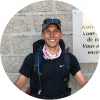The very best of Tour du Mont Blanc
Often hailed as one of the most spectacular alpine treks on the planet, the Tour du Mont Blanc is a true bucket-list adventure
Itinerary
-
Day 1 Arrival in Chamonix
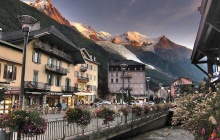 Welcome to Chamonix! Upon arrival, check into your hotel and take some time to settle in. In the early evening, your guide will meet you for a short briefing about the week ahead. Dinner is free to enjoy at a local restaurant or at your hotel (not included).
Welcome to Chamonix! Upon arrival, check into your hotel and take some time to settle in. In the early evening, your guide will meet you for a short briefing about the week ahead. Dinner is free to enjoy at a local restaurant or at your hotel (not included).
Accommodation: Hotel in the Chamonix Valley
Meals: Dinner not included
Guides briefing: 6:00 PM at the hotel
Optional: Airport transfer from Geneva available on request -
Day 2 Chamonix - la Flégère - Lac Blanc - Argentière
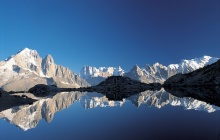 We begin with a short transfer by local bus to the village of Les Praz, followed by a scenic cable car ride up to La Flégère (1,913m). From here, a beautiful balcony trail leads us up to the stunning Lac Blanc (2,352m) and spectacular view of the massif: the Drus, the Vert, the Aiguille du midi, Mont Blanc and the Mer de Glace glacier. Descent to the village of Argentière through the forest.
We begin with a short transfer by local bus to the village of Les Praz, followed by a scenic cable car ride up to La Flégère (1,913m). From here, a beautiful balcony trail leads us up to the stunning Lac Blanc (2,352m) and spectacular view of the massif: the Drus, the Vert, the Aiguille du midi, Mont Blanc and the Mer de Glace glacier. Descent to the village of Argentière through the forest.
Ascent: +475 m / Descent: -1,150 m / Hiking Time: ~6 hours / Max Alt: 2,350 m / Transport: Local bus / Accommodation: Hotel / Full board
-
Day 3 Argentière - the Forclaz pass - Bovine - Champex
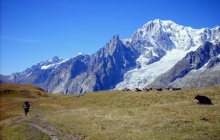 In the morning, a private transfer takes us across the border into Switzerland via Le Châtelard and the village of Trient, arriving at the Col de la Forclaz (1,527m). We begin our hike through a peaceful forest of fir and larch trees, climbing toward the alpine meadows of Bovine (1,978m) with sweeping panoramic views of the Combins massif before descending into the charming village of Champex.
In the morning, a private transfer takes us across the border into Switzerland via Le Châtelard and the village of Trient, arriving at the Col de la Forclaz (1,527m). We begin our hike through a peaceful forest of fir and larch trees, climbing toward the alpine meadows of Bovine (1,978m) with sweeping panoramic views of the Combins massif before descending into the charming village of Champex.
Ascent: +500m / Descent : -650m / Hiking time : 5/6 hours / Max. Alt : 1980m / Accomodation : Hotel / Full board
-
Day 4 Champex - Issert - Ferret - La Fouly - Courmayeur
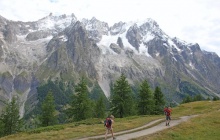 After a short transfer by minibus to La Fouly, we set out on foot from the village of Ferret. The trail leads us to the Grand Col Ferret, offering jaw dropping views over the Val Ferret and surrounding glaciers. From here, we descend into Italy and take a private minibus to reach Courmayeur.
After a short transfer by minibus to La Fouly, we set out on foot from the village of Ferret. The trail leads us to the Grand Col Ferret, offering jaw dropping views over the Val Ferret and surrounding glaciers. From here, we descend into Italy and take a private minibus to reach Courmayeur.
Ascent: +700 m / Descent: -500 m / Hiking time: 6–7 hours / Transport: Private minibus / Accommodation: Hotel / Full board
-
Day 5 Courmayeur
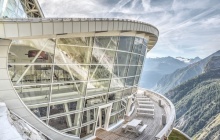 Today is a well-deserved rest day to relax your legs and enjoy the delights of Courmayeur. Opt in to the excursion up to Punta Helbronner (3,466m) via Skyway Monte Bianco cable car. If the spinning gondola isn’t for you, try a thermal spa circuit—or simply indulge in an epicurean foodie day.
Today is a well-deserved rest day to relax your legs and enjoy the delights of Courmayeur. Opt in to the excursion up to Punta Helbronner (3,466m) via Skyway Monte Bianco cable car. If the spinning gondola isn’t for you, try a thermal spa circuit—or simply indulge in an epicurean foodie day.
Activities: Free time in town, optional Skyway excursion / Transport: Public shuttle / Cable car / Accommodation: Hotel in Courmayeur / Meals: Breakfast & dinner included, lunch at your pleasure.
-
Day 6 Courmayeur - Seigne pass - Les Chapieux
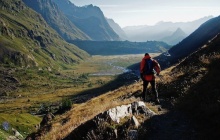 A short vehicular hop to La Visaille (1,659m), nestled beneath the Miage Glacier. We work our way up the serene vale of Lée Blanche, where sheep graze in summer on colourful alpine flowers. We cross back into France via the Col de la Seigne (2,516m), Mont Blanc's south face now firmly behind us, and descend into the Chapieux valley. Our home for the night not far.
A short vehicular hop to La Visaille (1,659m), nestled beneath the Miage Glacier. We work our way up the serene vale of Lée Blanche, where sheep graze in summer on colourful alpine flowers. We cross back into France via the Col de la Seigne (2,516m), Mont Blanc's south face now firmly behind us, and descend into the Chapieux valley. Our home for the night not far.
Ascent: +900 m / Descent: -490 m / Hiking Time: 6–8 hours / Max Alt: 2,516 m / Transport: Private minibus / Accommodation: Mountain inn or refuge / Full board
-
Day 7 Les Chapieux - Bonhomme pass - Les Contamines
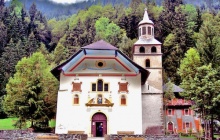 Our final day kicks off with a strong start from the rustic chalets of La Raja were we push upward to the Croix du Bonhomme refuge (2,639m), perched high above the valley floor. The views are wild, the air crisp, and the sense of achievement already building. Next, Col du Bonhomme (2,329m) and down the historic path toward the Chalet de la Balme, soaking in every last view. The trail leads us to the Nant-Borrant refuge, where we rejoin a wider path and begin our final descent. As the silhouette of the tiny chapel of Notre Dame de la Gorge comes into view, we know the journey is nearing its end. A peaceful stroll brings us back to Les Contamines—tired legs, full hearts, and stories to last a lifetime.
Our final day kicks off with a strong start from the rustic chalets of La Raja were we push upward to the Croix du Bonhomme refuge (2,639m), perched high above the valley floor. The views are wild, the air crisp, and the sense of achievement already building. Next, Col du Bonhomme (2,329m) and down the historic path toward the Chalet de la Balme, soaking in every last view. The trail leads us to the Nant-Borrant refuge, where we rejoin a wider path and begin our final descent. As the silhouette of the tiny chapel of Notre Dame de la Gorge comes into view, we know the journey is nearing its end. A peaceful stroll brings us back to Les Contamines—tired legs, full hearts, and stories to last a lifetime.
From there, we hop on our private transfer back to Chamonix. One last night in the mountains after a good bath—celebratory fondue, anyone?Ascent: +1,100 m / Descent: -1,400 m / Hiking Time: 7–8 hours / Max Alt: 2,635 m / Transport: Private bus / Accommodation: Hotel /Meals: Breakfast & lunch, dinner is yours to hunt
-
Day 8 Weeks end
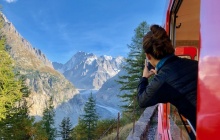 Enjoy a free morning to explore Chamonix town. The trip officially ends this morning.
Enjoy a free morning to explore Chamonix town. The trip officially ends this morning.
Meals: Breakfast included only
Please Note
Itineraries may be adjusted depending on weather conditions or the physical fitness level of the group. Ultimately, your guide has the final say and may modify the program as needed to ensure safety and overall experience.
All listed hiking times and elevation gains are approximate and may vary depending on the route choices made by the guide and the group’s pace. We encourage you to let go of rigid expectations—it's all part of embracing the mountain spirit and enjoying the journey.
Dates & prices
International departures:
| From | To | Price per person | Guaranteed | Booking |
|---|---|---|---|---|
| €1,890 | Yes | Book now! | ||
| €1,890 | No | Book now! | ||
| €1,890 | No | Book now! | ||
| €1,890 | No | Book now! | ||
| €1,890 | No | Book now! | ||
| €1,890 | No | Book now! |
Trip code: RTMBC
Included
Not included
Notes
International flights
Terms and conditions
Booking conditions
Invoice procedure
Cancellation policy
Cancellation by You
If, for any reason, you need to cancel your trip, the amounts you have paid will be refunded, subject to the following deductions:
You must notify us of your decision to cancel in writing, using any method that provides acknowledgment of receipt. The cancellation date will be determined based on the date we receive your written notice.
In case of cancellation, for any reason, the following cancellation fees will apply:
- More than 31 days before departure: 30% of the total trip cost (excluding insurance)
- 30 to 21 days before departure: 40% of the total trip cost (excluding insurance)
- 20 to 14 days before departure: 50% of the total trip cost (excluding insurance)
- 13 to 7 days before departure: 75% of the total trip cost (excluding insurance)
- Less than 7 days before departure: 100% of the total trip cost (excluding insurance)
Special Cases
Regardless of the cancellation or contract modification date, the following fees are added to the above scale:
- Non-refundable fixed ground fees: Any firm bookings made early (such as certain mountain huts) will be charged in case of cancellation.
- Insurance and registration fees: Whatever the insurance policy chosen, the cost of insurance and registration fees are non-refundable.
Cancellation by Us
Altaï France may cancel a trip free of charge in the following cases:
- If the minimum number of participants required to run the trip is not met.
- In case of exceptional and unavoidable circumstances, especially related to mountain conditions and customer safety.
In such cases, Altaï France will propose alternative solutions. If no suitable alternative is available, any unused services will be refunded. No additional compensation can be claimed.
You will be informed of any cancellation as soon as possible, and no later than:
- 30 days before departure for self-guided or exclusive trips
- 20 days before departure for trips longer than 6 days requiring a minimum number of participants
- 7 days before departure for trips lasting 2 to 6 days
- 48 hours before departure for trips shorter than 2 days
If Altaï France is forced to cancel all or part of the trip due to circumstances that compromise customer safety (e.g., poor mountain weather), the unused services will be refunded. No additional compensation will be provided.
For safety reasons and to ensure a consistent group level as described, the guide and organizers reserve the right to terminate your participation if your technical level or physical condition does not meet the requirements. In such a case, no refund or compensation will be provided.
Changes to travel contract
Pricing
Contract transfer
Insurance
Practical info
Staff
Food
Meals
Picnic lunches are sourced from local stops along the
route—mountain refuges, cheesemakers, and more.
Evening meals are served at
your accommodation or in nearby restaurants.
We recommend bringing along
your favorite trail snacks before departure—energy bars, chocolate, dried
fruits… and feel free to bring local treats from home to share during
trail-time aperitifs!
Drinks
Tap water will be available daily to refill your bottles
during the trek. Drinks—including bottled water—are not included in the
package. To reduce waste, please avoid buying plastic bottles when possible. If
you need to purchase bottled water, opt for large bottles to refill your own
and let your guide know in advance to plan a stop.
Although mountain water flows freely, it isn’t always safe to drink. Always check with your guide. Use village fountains or private outdoor taps—only after asking permission. Your guide will often carry a thermos of hot water for tea breaks on the trail.
Accommodation
Transportation
Budget & exchange
Credit cards are very
useful during travel. ATMs are available in most
towns, but we can’t guarantee every card will work everywhere.
Tips
Travelers often choose to cover drinks for their guide. A
shared “kitty” or tip pool at the beginning of the trip can be a convenient way
to manage this (completely optional).
Supplied equipment
Material
Technical Gear:
- Well-worn in hiking boots with
Vibram soles and ankle support (never new!)
- Trekking poles (telescopic)
- Sleeping sheet/silk liner
- Compact toiletries +
quick-dry towel
- High SPF sunscreen &
lip balm
- Headlamp with spare
batteries and bulb
- 1.5L water bottle or
hydration system (Camelbak)
- Pocket knife
- Toilet paper + lighter
- Plastic bags (2–3 of 100L)
for waterproofing your gear
- Lunchbox or tupperware with
cutlery
Personal Clothing:
- Warm hat
- Sun hat or cap and/or scarf
- High-quality UV-protective
sunglasses (category 3)
- Fleece or wool gloves
- Breathable, technical base
layers
- Long-sleeve technical
mid-layer
- 2 short-sleeve breathable
shirts
- Fleece jacket
- Down or insulated jacket
- Waterproof and windproof
shell (e.g. Gore-Tex)
- Technical leggings
- Comfortable hiking trousers
- Shorts or capri pants
- Windproof over-trousers
- Two pairs of socks (1
light, 1 thick—avoid cotton!)
- Sleepwear
Luggage
- One travel bag for your replacement clothes, transferred by the assistance vehicle (max 10kg, 60x40cm), warning : one person one bag !
- A 30L daypack with a wide hip belt and chest strap. Line it with a plastic bag to keep your gear dry.
Guide's Tip – What to pack in your daypack:
- Warm clothing (fleece,
pants, hat & gloves)
- Rain gear
- Water bottle
- Camera*
- Sunscreen
- Your picnic lunch
Do not pack in your main bag:
- Electronics (laptops,
tablets)
- Cameras
- Valuables
Bags containing these items
will not be accepted by the luggage service.
Medicine
Your guide carries a first-aid kit for emergencies. You
should also bring a personal medical kit tailored with your doctor’s advice:
- Personal prescriptions
- Pain relievers (preferably
paracetamol)
- Blister pads & plasters
- Local antiseptic
- Anti-inflammatory
- Anti-spasmodic
- Anti-diarrheal
- Anti-nausea
- Intestinal antiseptic
- Eye drops
- Mild sleeping aid
- Earplugs
- Broad-spectrum antibiotics
- Vitamin C
(This list is non-exhaustive.)
Passport
Visa
- A Schengen visa is required for any Non-EU citizens.
Identity card
Mandatory vaccines
Health information & recommendations
Please keep in mind that our journeys often take us into remote areas, far from immediate medical assistance. Be sure to read the itinerary and trip details carefully to ensure that our adventure travel style is right for you.
This trip involves travel at high altitudes. While most people can comfortably reach elevations up to 2,500 meters with minimal symptoms, individual reactions to altitude can vary. Altitude sickness is rare but possible. For personalized advice and preparation, we recommend speaking with your physician before your trip.
We strongly recommend
beginning a training routine at least 3 months before your departure. Aim for
2–3 endurance workouts per week (minimum 1 hour each) and one weekend hike of
6+ hours with elevation gain of 350m/hour.
Please inform us of any
medical conditions (allergies, asthma, diabetes, past cardiac issues, etc.) as
soon as possible.
Hygiene in the Mountains
Water is often abundant,
but not always safe to drink—refill only from designated potable sources.
Always ask your guide.
Bring a thermos of hot
water for tea breaks—it’s a mountain essential!
Weather
Weather
& Climate
You’ll be trekking in
mid-mountain terrain, where temperatures stay cool—even in summer. In the Alps,
the temperature drops by about 0.65°C for every 100m of elevation gain. Dress
in layers and be prepared for sudden changes.
Mountain weather is unpredictable—you might start in sunshine and face a thunderstorm by afternoon. Always carry gear for warmth and rain protection..
Electricity
Plug Info:
France: Type E plug (2 round
pins + grounding hole), 230V, 50Hz
Italy: European standard (2–3
round pins), 220–230V, 50Hz
Switzerland: Type J (3 round
pins in hexagonal pattern), 230V, 50Hz. Not all European plugs will fit—bring
an adapter.
Local time
Daylight Saving Time
(CEST): UTC+2
Sustainable tourism
We invite you to be part of
this mission by respecting the mountains and following these simple guidelines:
Carpool or use public transport for transfers when possible—especially in the Chamonix Valley, which has
excellent train and bus options.
Leave no trace during picnic
breaks—bring a small trash bag if no bins are available and sort your waste
properly.
Smokers: Please don’t litter
cigarette butts, especially in snowy areas. Why not use this trip as a breath
of fresh air… literally!
Lift passes: If you're skiing,
return your magnetic ski passes for recycling.
Wildlife: The mountains are
home to many animals—observe respectfully and stick to marked trails.
Let’s keep the mountains
beautiful—for today, and for generations to come.


